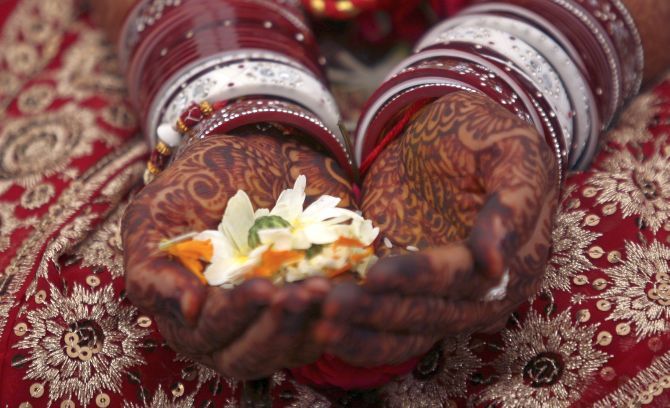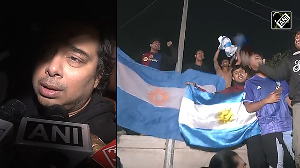The apex court said the exception in the rape law was contrary to the philosophy of other statutes and violates the bodily integrity of a girl child.

Sexual intercourse with a girl below 18 years of age, even by the husband, would now amount to rape, the Supreme Court held on Wednesday in a historic verdict which criminalised sex with a wife who is not a major.
The apex court read down a provision in the Indian Penal Code of 1860 exempting males from being tried for rape if the wives were between the age of 15 and 18 years.
The top court also made clear that it had not 'dealt with the larger issue of marital rape (sexual intercourse with wife without her consent) of adult women' as it was not raised before it.
In an unprecedented decision, the top court amended the wordings of 'Exception 2 of Section 375 (definition rape) of the IPC, which would now read: 'Sexual intercourse or sexual acts by a man with his own wife, the wife not being under eighteen years of age, is not rape.'
Earlier, the provision stated that sexual intercourse by a man with his wife is not rape if she is not under 15 years of age.
The apex court also made it clear that this judgment will have a 'prospective effect'.
"The issue before us is limited but one of considerable public importance -- whether sexual intercourse between a man and his wife, being a girl between 15 and 18 years of age, is rape? Exception 2 to Section 375 of the IPC, 1860 answers this in the negative, but in our opinion sexual intercourse with a girl below 18 years of age is rape, regardless of whether she is married or not.
"The exception carved out in IPC creates an unnecessary and artificial distinction between a married girl child and an unmarried girl child and has no rational nexus with any unclear objective sought to be achieved," a two-judge bench headed by Justice M B Lokur said in a path-breaking judgment.
Justice Deepak Gupta, who wrote a separate 57-page-long verdict, concurred with the findings of Justice Lokur and said, "I am clearly of the opinion that Exception 2 to Section 375 IPC in so far as it relates to a girl child below 18 years is liable to be struck down...".
Justice Gupta said the provision was 'arbitrary, capricious, whimsical and violative of the rights of the girl child and not fair, just and reasonable and, therefore, violative of Article 14, 15 and 21 of the Constitution'.
The two separate but concurring verdicts, running into 127 pages, dealt with various aspects, such as the practice of child marriage, indifferent treatment meted out to married children, adverse effects of sexual intercourse, violation of their human rights, anomalies in laws and apathy of Parliament in preventing such a malice.
Both the judges were unanimous that there should be harmonious construction of all pro-child laws -- the Juvenile Justice Act, the Protection of Children from Sexual Offences Act (POCSO), the Prohibition of Child Marriage Act and the IPC to avoid any conflict among them while dealing with the issue of sexual intercourse involving a girl below the age of 18.
"There is an apparent conflict or incongruity between the provisions of the IPC and the POCSO Act. The rape of a married girl child (a girl child between 15 and 18 years of age) is not rape under the IPC and therefore not an offence in view of Exception 2 to Section 375 thereof, but it is an offence of aggravated penetrative sexual assault under Section 5(n) of the POCSO Act and punishable under Section 6 of that Act.
"This conflict or incongruity needs to be resolved in the best interest of the girl child and the provisions of various complementary statutes need to be harmonised and read purposively to present an articulate whole," the bench said.
"The artificial distinction (between a married girl and others between the 15 to 18 years of age group) is arbitrary and discriminatory and is definitely not in the best interest of the girl child. The artificial distinction is contrary to the philosophy and ethos of Article 15(3) of the Constitution as well as contrary to Article 21 of the Constitution and our commitments in international conventions.
"It is also contrary to the philosophy behind some statutes, the bodily integrity of the girl child and her reproductive choice. What is equally dreadful, the artificial distinction turns a blind eye to trafficking of the girl child and surely each one of us must discourage trafficking which is such a horrible social evil," Justice Lokur said.
The court voiced concern over thousands of minor girls being married in mass wedding ceremonies on the occasion of Akshaya Tritiya and observed that child marriage cannot go on like this just because this illegal practice was assumed to be legal and going on for ages.
It had earlier also questioned the Centre how Parliament could create an exception in law declaring that intercourse or a sexual act by a man with his wife, aged between 15 and less than 18 years, is not rape when the age of consent is 18.
The first two paragraphs of the first verdict, penned by Justice Lokur, gave a clear cut indication saying that '...in our opinion, sexual intercourse with a girl below 18 years of age is rape regardless of whether she is married or not'.
Justice Gupta also opined on the same lines as Justice Lokur did.
"The exception carved out in the IPC creates an unnecessary and artificial distinction between a married girl child and an unmarried girl child and has no rational nexus with any unclear objective sought to be achieved," Justice Lokur said.
Justice Lokur said that the 'artificial distinction' was arbitrary and discriminatory and definitely not in the best interest of the girl child.
The bench lashed out at the Centre for not criminalising sexual intercourse with a girl under 18 years of age even if the exploiter was her husband.
The apex court rejected its justification to legitimise the 'heinous offence' on the ground that the practice has been prevalent for a long time.
"What has the government of India done? It has persuaded Parliament to convert what is otherwise universally accepted as a heinous crime into a legitimate activity for the purposes of Section 375 (definition of rape) of the IPC if exploiter or abuser is the husband of the girl child.
"But, contrarily the rape of a married girl child (called 'aggravated penetrative sexual assault' in the POCSO Act) is made an offence for the purposes of the POCSO Act," the bench said.
Dealing with the affidavit of the government on the IPC provision exempting males from being tried for rape if the wives were between the age of 15 and 18 years, the bench rejected its justification that by virtue of getting married, the girl child has consented to sex with her husband, either expressly or by necessary implication.
"In law, it is difficult to accept any one of these justifications. There is no question of a girl child giving express or implied consent for sexual intercourse. The age of consent is statutorily and definitively fixed at 18 years and there is no law that provides for any specific deviation from this," Justice Lokur, in his 70-page judgment, said.
Justice Gupta too was not impressed with the government justifying child marriage on the ground that it was a traditional practice which must be respected and that criminalising marital rape could destroy the institution of marriage.
"I am not impressed with the arguments raised by the Union of India. Merely because something is going on for a long time is no ground to legitimise and legalise an activity which is per se illegal and a criminal offence," Justice Gupta, in his separate 57-page verdict, said.
The top court also observed that the reasons and justifications of the government 'completely side track the issue and overlook' the provisions of the Prohibition of Child Marriage Act (PCMA), the Juvenile Justice Act and the POCSO.
"Surely, the Union of India cannot be oblivious to the existence of the trauma faced by a girl child who is married between 15 and 18 years of age or to the three pro-child statutes and other human rights obligations.
Image used for representational purposes only. Photograph: Amit Dave/Reuters










